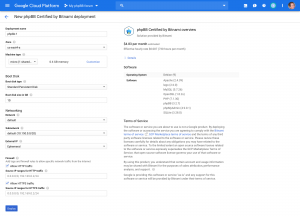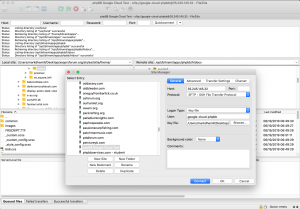Introduction
I recently wrote a post about putting phpBB in the Google Cloud. I learned that it’s not too hard to do if you have decent technical skills or even if they are more modest. There could be some serious upsides to putting your forum in a cloud like Google’s, Amazon Web Services (AWS) or Microsoft Azure. (There are other cloud vendors out there.) These could include lower costs, higher uptime, and scalability if you forum gets suddenly popular.
Most of us though contract with web hosts. For example, I use Siteground. Web hosts have server rooms somewhere where they keep all the equipment they need to host your forum plus lots of other websites. Most web hosts have multiple server rooms in various countries. The closer these are to their customers and their site viewers, the better. For example, Siteground has server farms in Chicago, London, Amsterdam and Singapore. They have incentive to organize their data centers to be fast and reliable because they control them. Siteground does this not only with four server farms, but by having an end-to-end solid state infrastructure. They figured out that although solid state drives (SSDs) were more expensive, they were heaps more reliable and faster than filling their server rooms with mechanical disk drives. It’s been key to their success as a company.
Virtual hosting
These days though some web hosts are figuring out they don’t need to bother with the actual hosting anymore. There are two ways they do this. One is old, the other is new.
The first way is to be a reseller. For example, ABC Hosting may actually rent servers in (hypothetically speaking) a Rackspace server room. Becoming a reseller is not hard. Siteground will let you be a reseller. Resellers are often people like me who have multiple clients and as a convenience to their customers also provide hosting. I don’t want to bother setting up a server farm, particularly if I can lease one. If I did, I would probably choose to become a Siteground reseller, since Siteground’s spiffy servers sold me on being their client. Siteground would provide a front end console for me to use, and consoles that my customers would use too to which I would apply my own logo and some custom pages. From the customer’s perspective, it looks like I have my own server room. The downside is that I would become responsible for any hosting issues. I would essentially be the support department, and I’m not available 24/7. I don’t want to get involved in the minutia of my client’s hosting, so I don’t expect to ever become a reseller, even though it would generate a good deal of passive income for my business.
The second way is that some web hosts are becoming virtual by using cloud providers. Who’s the number one host on the web? You probably don’t have to think too much: GoDaddy. You may be surprised to learn that in 2018, GoDaddy decided to move much of its hosting inside AWS. You can read why here. Basically, GoDaddy realized that AWS built a much better infrastructure. They can resell Amazon’s cloud services under their own label for less than they can maintain their own hosting centers. AWS has a sophisticated set of services and they have the fast connection and high reliability thing all figured out. This is not good news for GoDaddy’s hosting staff. Presumably most of them will be laid off at some point.
All this suggests that web hosting will be undergoing a fundamental transformation as hosts ditch their own hosting centers to find better reselling deals in the cloud. In short, your web host may become a virtual web host. If you host on GoDaddy, there’s a good chance it’s already virtual hosted on AWS.
Should you host in the cloud?
This does raise the question: why not just buy your hosting from a cloud vendor like AWS and skip a middle man? If you read my posts on cloud hosting, you’ll realize the main issue is that cloud hosting tends to be complicated to set up, maintain and troubleshoot, at least from the perspective of someone trying to get some web space without a lot of technical skills. Virtual web hosts like GoDaddy essentially become front ends for optimizing the hosting experience for people likely a lot like you who want the process to be simpler. So they offer 24/7 support, domain management and basic customer handholding while putting up a virtual front end that suggests they are doing all this themselves when in fact the technical infrastructure is outsourced to a major cloud vendor.
My bet is that at some point Siteground will do the same, in which case I will have less reason to use them. If I know a suite of virtual web hosts are all using AWS, for example, I can get choosier and choose a virtual host based on their support and the ease by which I can do things via their control panels. I can assume the reliability and speed will all be excellent since they are hosted in a professionally managed commercial cloud. Since I do have the technical skills to put my sites in a cloud like AWS, at some point I will probably just do that. I pay a premium primarily to call someone on the phone to resolve some technical issues. Right now the $20/month I pay for Siteground hosting for my domains is reasonable, even though I am guessing I could pay $10/month or less putting my sites in the cloud. I’d just have to fix any technical problems myself, and right now the cost difference doesn’t make it worth my time.
For most of you, this is probably true too. Price is certainly important when you decide who to host with, but ready support, easy interfaces to managing your sites and fast page load speeds probably matter more. At some point you either won’t know or won’t care if your web sites are actually in a major cloud vendor’s facilities somewhere. Virtual web hosts aren’t probably going to advertise this either.
If interested in Siteground hosting, use my affiliate link
If you are intrigued about my discussion of Siteground for web hosting, learn more on my rehosting page. If you decide to host with Siteground, please use my affiliate link. You won’t pay anything extra and I will earn a small commission.


